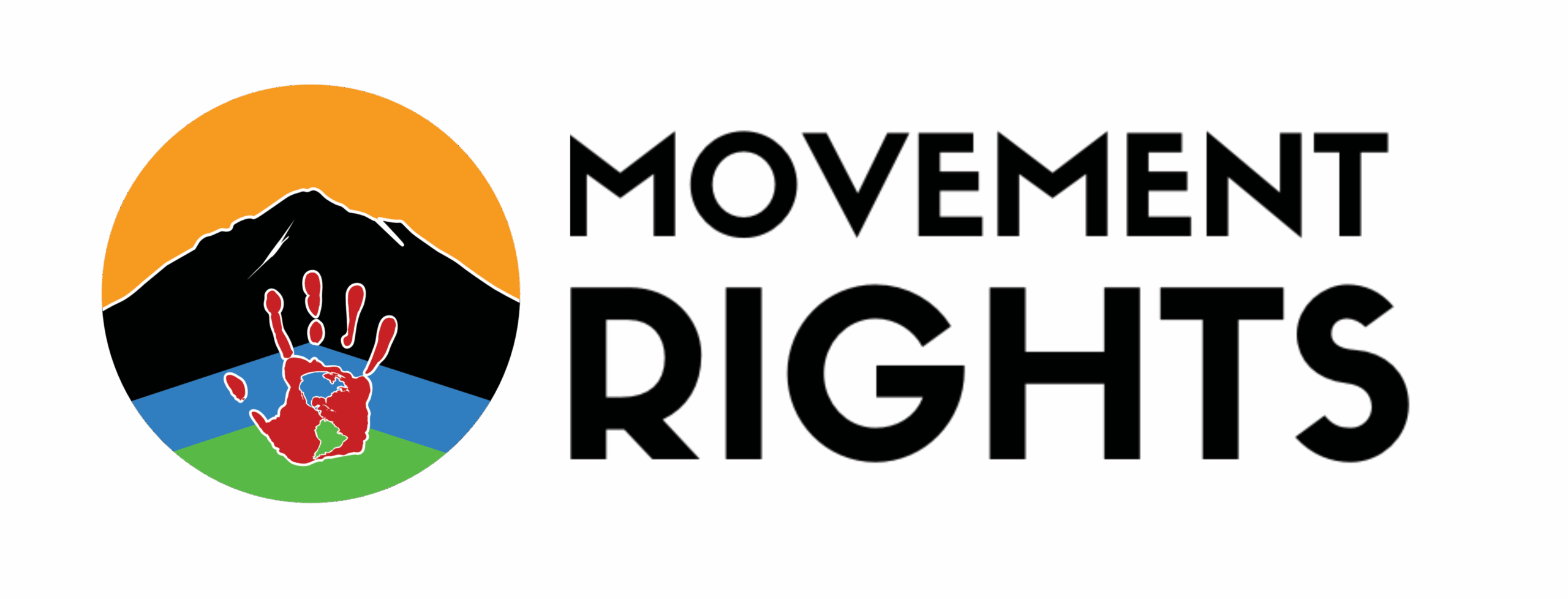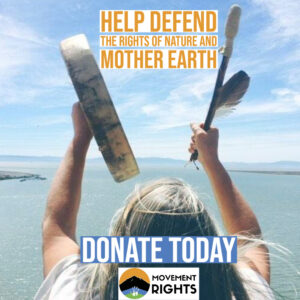Water is alive. It needs to be respected. We must recognize her as a living entity.— Water Warrior Grandmother Josephine Mandamin, Ojibway
By Casey Camp Horinek, Shannon Biggs & Pennie Opal Plant, Movement Rights
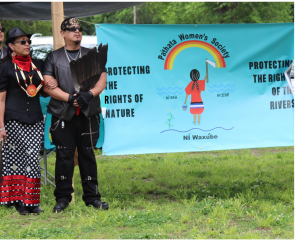
The Indigenous world understands that “water is life.” Not just for humans, but for all species interconnected in the system of life. Water is sacred. All humans have the responsibility to care for the waters. In many Indigenous cultures around the world, water in all forms is our feminine ancestor and women have a special relationship with water. We are born in water, in the womb of our mothers. In many cultures it is the grandmothers’ responsibility to lead other women in protecting and praying for the waters. For the Ponca people, rivers are themselves considered sacred feminine entities. Following the Original Instructions of the Ponca tribe since the beginning, the Ponca hereditary Women’s Society, Pa’thata, have always been the keepers of the Waters for the tribe, even after forced removal to what is now called Oklahoma.

In 2021, the Ponca Nation of Oklahoma is poised to again make Rights of Nature history by adopting a law recognizing the legal rights of two Rivers in their territory: Ní’skà, (the Arkansas River) and Ni’ží’dè, (the Salt Fork River). In 2017 Movement Rights led an Indigenous delegation to learn from the Maori of Aotearoa (New Zealand) and the guardianship model they implemented to protect the Whanganui River (the first river in the world to “own itself”). The Ponca Pa’thata Women’s Society will take their hereditary responsibility to serve as the guardians of the two rivers. We believe the Ponca Rights of Rivers guardianship can become a powerful on the ground organizing model regionally and internationally. These majestic Rivers are under threat from fossil fuel activities including refineries, fracking, pipelines and more.
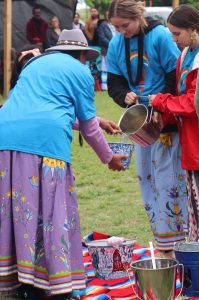
Law follows culture, not the other way around
The Pa’thata Women’s Society have taken on their traditional responsibility to ensure the existing Ponca Rights of Nature law—and the anticipated Rights of Rivers’ law become strong models that leverage and contribute to the power of the global movement for culture shift. On Mother’s Day, May 9, 2021 the Pa’thata held their first Rights of the Rivers ceremony at the Ponca powwow grounds. Over 100 people from the Ponca and regional tribes gathered for the event, dozens of whom brought water from their own sacred rivers, including the Missouri River, and even Aotearoa’s Whanganui River. Women lined up in prayer as they added their water to the shared buckets. A small group of women from the Pa’thata Society carried the buckets in prayer to the riverbank, where the waters were joined with the rushing river.
Upon returning to the powwow grounds, the community gathered to feast, and watch as the Pa’thata women danced to traditional songs around the drum circle and singers. Homage and prayers were also offered to the Missing and Murdered Indigenous Women (MMIW). A tipi, painted red by the community earlier in the week, was put up by the men. Those whose loved ones are among the missing were asked to paint their handprints on the tipi and write the names of their beloveds to be remembered, prayed for and honored. Some photos from the day are below, click here to view the entire gallery:
What’s Next and How You Can Help
The Mother’s Day ceremony was significant, marking the beginning of the protection of the rivers’ rights. Not just for the Ponca, but among the many tribes along the Rivers’ journey, as well as up to the Ponca tribes original homelands along the Missouri River, near Standing Rock.
In the year ahead our goal is to organize with other regional tribes to stand with the Pa’thata Women’s Society, and strengthen the anticipated Ponca’s legal recognition of the rivers as holistic ancestors that own themselves. Movement Rights will support the Pa’thata through a series of collaborative activities including
- hosting Intertribal Rights of Nature (IRON) forums;
- direct action where fossil fuel contaminates the rivers;
- encouraging regional tribal endorsement/adoption of similar laws; and
- cultivating powerful international partnerships, delegations and exchanges with other Indigenous tribes who have recognized Rights of Nature.
The work ahead is to make the Ponca Rights of Nature and the potential Rights of Rivers’ tribal statute become strong models that leverage and contribute to the power of the global movement for culture shift. Asking the river to tell us what her restorative needs are will be part of the Pa’thata Women’s Society’s work. This will include having water testing done, mapping fossil fuel contamination, working with the Ponca Business Council and tribal community, organizing efforts (including direct action), and holding water ceremonies with other tribes along the rivers. We will begin organizing with other tribes to pass similar legislation or otherwise support the Pa’thata, and participate in direct action, monthly water ceremonies and prayer for the rivers.
 Movement Rights and the Pa’thata Women’s Society will host regional and national Intertribal Rights of Nature (IRON) Forums. Recognizing the Rights of Nature is a powerful way of defining human responsibilities to the sacred in ways that can be broad or specific. IRON Forums bring together members of other tribes interested in how this framework might support their sacred waters and territory, and regionally, to bring the tribes along the Salt Fork and Arkansas rivers together. (For Indigenous people interested in joining these conversations, join our newsletter list for upcoming opportunities).
Movement Rights and the Pa’thata Women’s Society will host regional and national Intertribal Rights of Nature (IRON) Forums. Recognizing the Rights of Nature is a powerful way of defining human responsibilities to the sacred in ways that can be broad or specific. IRON Forums bring together members of other tribes interested in how this framework might support their sacred waters and territory, and regionally, to bring the tribes along the Salt Fork and Arkansas rivers together. (For Indigenous people interested in joining these conversations, join our newsletter list for upcoming opportunities).
Globally, there is also work to be done, including hosting in person and online gatherings of Indigenous communities that have instituted guardianship and other Rights of Nature models to learn from each other. As Covid-19 and funding permits, this will include travel to meet with international Indigenous partners to share firsthand our collective experiences. Casey Camp Horinek has been named co-chair of the emerging Indigenous Council of the Global Alliance for the Rights of Nature (GARN) which we believe will become an important and powerful connecting point for this Indigenous-led movement.
Historically, the US legal system has been hostile to recognizing Rights for the Right-less. Only through deep on the ground organizing with national and international support can we begin to change culture and law to recognize our human responsibilities to the ecosystems that sustain life. Looking only at Turtle Island, showcased at Standing Rock and from the Arctic Circle to the Bayou, Indigenous people have always put their bodies on the line to stand for “water is life.” Everywhere, Indigenous peoples protect the sacred system of life not only for their tribes, but for everyone living, for future generations and all forms of life. Indigenous-led Rights of Nature in North America is our best hope for the kind of powerful culture shift needed to confront a legal system that protects elite wealth and sees nature as property. The Ponca are already leaders of what can be described as the “civil rights struggle” for the Earth’s Rights.
Globally, it is no coincidence that Indigenous peoples protect 80% of the world’s biodiversity and lead the global movement for the Rights of Nature, albeit informally. Casey Camp Horinek, the Ponca Nation and Movement Rights want to help connect Indigenous Rights of Nature leaders from around the world to support and learn from each other—and strategize ways to to elevate Rights of Nature as a necessary global framework that shifts culture and law based on traditional wisdom of living in balance with the Earth, even in the modern world.
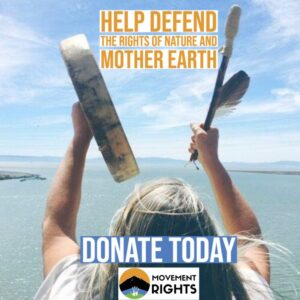 Lastly, we ask for your help in supporting this campaign. We have little time to take important effective action for our Mother, the Earth. If you are able to contribute to this work, please make a donation to Movement Rights today. Thank you.
Lastly, we ask for your help in supporting this campaign. We have little time to take important effective action for our Mother, the Earth. If you are able to contribute to this work, please make a donation to Movement Rights today. Thank you.
